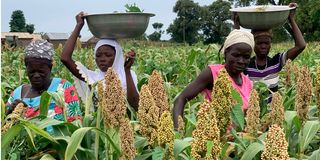How cash cropping changed fortune for Ghana women

Smallholder sorghum farmers during a field day on best farming practices, organized by 2SCALE in Podaguur village, Garu District, Ghana.
What you need to know:
- In 2012, it dawned on a group of women in Ghana that poverty and hunger would always be with them unless they transitioned from traditional farming methods.
- They realised that agribusiness needed finance.
- That was the beginning of ‘Faranaya’, an association of women in agribusiness, and whose meaning is – poverty has ended.
Ten years ago, Juliana Zangina would cultivate her small piece of land year-to-year, but never had enough food to feed her family.
Like many African women, she would follow after her husband in their family farm to cultivate crops then wait for the season to dictate how the harvest would be.
Today, Ms Zangina and other women from northern Ghana are well-informed small scale commercial farmers who practice agriculture differently from their forefathers.
It was, however, not until 2012 when it dawned on the women that poverty and hunger would always be with them unless they took the first risk to change from their traditional farming methods.
“We formed a group to share our ideas and learned from experts how we could practice more productive agriculture. We realised that agribusiness needed finance to buy inputs such as certified seeds, fertilizer, pest control, and crop management,” says Ms Zangina.
The group noted the need to commit more hours on their farms, not only cultivating but also monitoring and evaluating how the crops were doing.
“We decided to begin with sorghum for commercial purpose, and later got contracted to supply to the local Guinness Ghana Breweries,” explains Ms Zangina.
That was the beginning of ‘Faranaya’, a northern Ghana association of women in agribusiness, and whose meaning is – poverty has ended.
“From the income, I have been able to educate my children whom before I struggled to. I have also transformed my life as I save part of my earning for other investments in future,” adds Ms Zangina.
According to Faranaya group business advisor Patience Anyebo, on average, one-acre of sorghum fetches 2,000 Ghana Cedi (Ksh29, 340) a harvest.
“The breakthrough was because the women agreed to form small grassroots groups and we were able to support them with needed resources under the 2SCALE project, which brought on board micro-financers, agronomist and farmer-training services,” explained Ms Anyebo during a conference to mark 10 years of agribusiness accomplishment by small scale farmers from Eastern and Western Africa, held at a Nairobi hotel early this year.
The meeting was organised by the 2SCALE Program, which is funded by the Netherlands Government to support micro, small and medium enterprises in agribusiness and agri-processing sectors in Eastern and Western Africa.

Female sorghum farmers from Garu District, Upper East Ghana during a training on Aflasafe application for the control of aflatoxin in sorghum produce.
The meeting heard that northern Ghanaian men were afraid of taking the risk to engage in commercial sorghum farming, but are —nevertheless—happy it employs them in the women-led value chain processing system. Some as supervisors in the farms, which the women have consolidated to optimise production.
More men participate in mechanised cultivation, spraying and during harvesting. Part of the harvested sorghum is fortified into seeds and the residual converted into fertilizer, animal feed and bio fuel.
During the two-day benchmarking event, speakers lamented the half-heartedness of big financial institutions to support small agribusinesses citing risks, yet they financed similar-size entrepreneurs in other sectors.
Ruth Kinoti, Managing Director and CEO of Shalem Investments Limited, a manufacturer of assorted flour products in Meru County, says scaling up a small business to a medium level one and beyond, faces many bottlenecks, particularly due to lack of tailor-made financial programs modelled particularly for transitional entrepreneurs.
Established financial institutions view agribusiness start-ups as a fairly risky venture compared to other non-agriculture ones.
“If you are not careful and do not engage a financial advisor, you will likely find yourself burning your fingers in the process of up-scaling your business,” she cautions.
“We need to address financing models as a serious gap challenge that is going to reverse achievements of many would-be multi-national manufacturers, currently trying to transform their level of manufacturing,” Ms Kinoti adds.
Despite the challenges involved, experts believe that agribusiness small scale farmers and agri-processors hold the key to Africa’s food production and nutrition and also of alleviating rural population from poverty.
Considering that the burden of having an empty plate resonates more with the women than men, it makes better sense to empower the woman of Africa to produce more and make a better yield for the increasing population.
Henk Van Duijn, chair of the 2SCALE Supervisory Board says Africa has a big burden ahead of feeding 1.5 billion mouths by 2025. This is before this population increases to four billion by the turn of the century, according to United Nations’ population estimates.
“Anyone looking at this will think that Africa might not be able to feed herself. No, Africa is capable of feeding itself. For this to happen, the continent must stop relying on aid to support its agriculture and instead focus on ‘integrated inter-support business model’ that interconnects the small-scale farmer at the grassroots with the value chain manufacturer and the consumer market,” says Mr Van Duijn.
Albin Hubscher, President and CEO of the International Fertiliser Development Centre explains that Africa needs to stop the conversion of forest and grazing land into agriculture not only to reduce climate change problem, but also to improve soil health and fertility within the existing agricultural land.
“Use of fertiliser, organic or inorganic, is only meaningful if we consistently improve soil health by bringing carbon back into depleted soils to help retain moisture and close ecological yield gaps, in the end putting money into the farmers’ pocket,” Mr Hubscher concludes.




